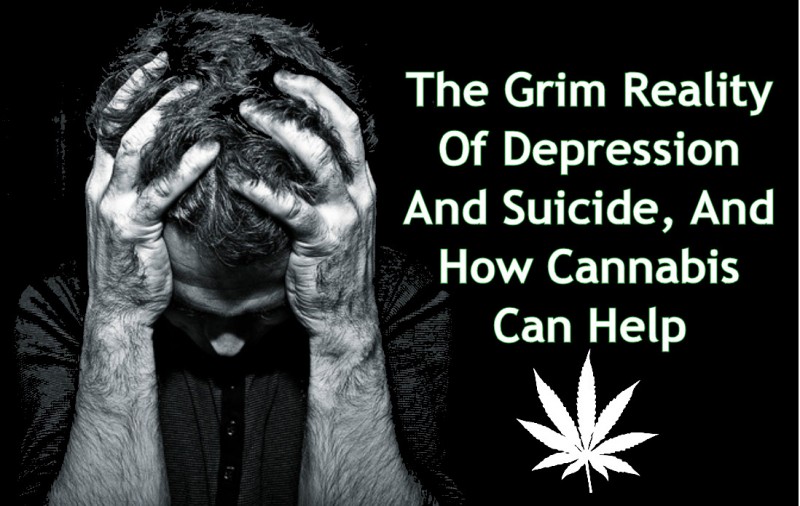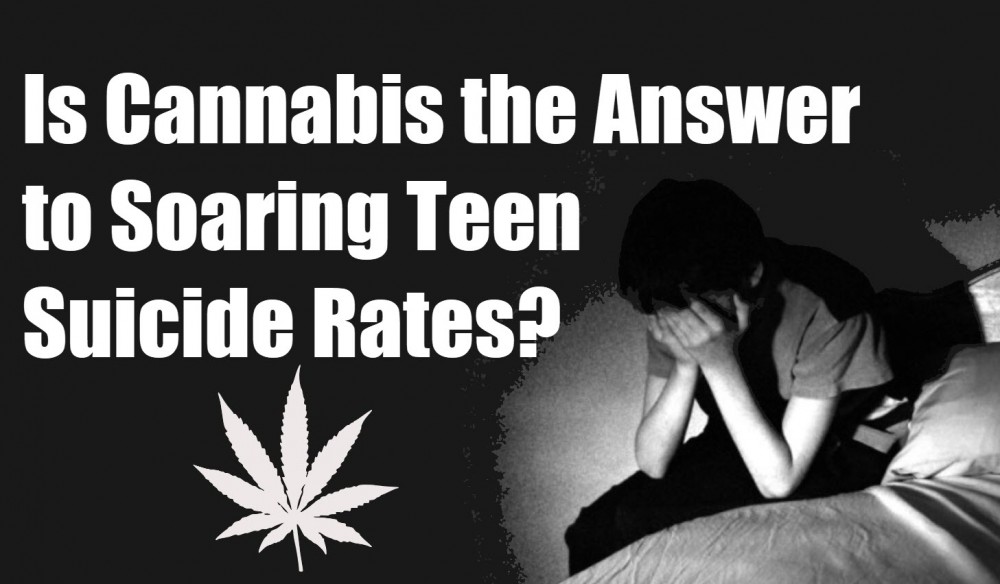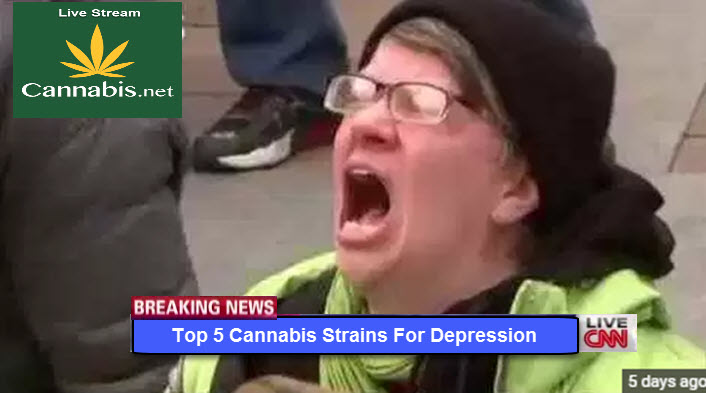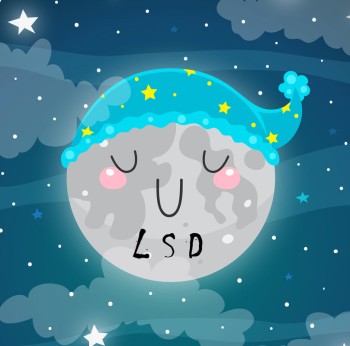The Grim Reality Of Depression And Suicide, And How Cannabis Can Help
Cannabis Helps Fight of the Grim Realities of Depression and Suicidal Thoughts from CannabisNet on Vimeo.
The recent high-profile suicide deaths of Kate Spade and Anthony Bourdain have struck a chord with the rest of the world. It has put the spotlight on the reality of depression, a silent killer plaguing society, which can lead to the sensitive topic of suicide.
No matter how many studies have already been published on depression, it’s still such a gray area. There is so much we still don’t know about this mental illness, nor do we know how to treat it. Scientists are working on everything from mushrooms to ketamine and MDMA, and we’ve got people flying all the way to Peru to partake of an ayahuasca ceremony to treat depression.
Kate Spade and Anthony Bourdain seemed to have it all. Wealth, fame, an empire built on fashion and a love for food, respectively. We all knew that; their lives looked perfect on the surface but they were battling a demon inside that few actually knew about, or took notice. After Spade’s death, her husband came forward about her depression. He said that his wife was suffering from depression for years, and that there was “no indication and no warning that she would do this. It was a complete shock.” He also said that she was actively getting help for her depression and anxiety, and she was taking medications – could these medications have triggered her suicidal behavior?
On the other hand, it was public knowledge that Bourdain had a problem with alcohol. In the past, he battled with addictions to heroin but his battle with the bottle never ended. While people never look twice or bothered when the famous bad-boy chef chugged beers or took shots of soju in South Korea, Bourdain hinted at his depression although no one took notice either. When he was filming a 2016 episode for Parts Unknown, he spoke to a therapist and said that something as mundane as eating a burger at an airport could initiate “… a spiral of depression that can last for days.”
“I feel kind of like a freak and I feel kind of isolated,” Bourdain said. In 2017, he spoke to The Guardian and said that he had occasional episodes of psychotic rage. “I was an unhappy soul… I hurt, disappointed, and offended many, many people, and I regret a lot. It’s a shame I have to live with.”
What about the suicides that don’t get this level of publicity? Suicide is the 10th leading cause of death in the United States, and this translates to 44,965 suicide deaths each year. How many more suicides is it going to take for people to realize that cannabis should be the medicine they’re looking for to treat this affliction.
What The Science Says
Cannabis can not only treat depression, it can also reduce the likelihood of suicidal behavior.
New research from Canada revealed that cannabis has not been linked to suicide among psychiatric patients, despite what prohibitionists are saying. The McMaster University researchers assessed data from 909 psychiatric patients; 465 of which were men and 444 were women with an average age of 40. They also analyzed data from 112 and 158 women who had attempted suicide in the past.
The study, which was published in the Biology of Sex Differences, acknowledged the fact that previous studies suggest that cannabis use is tied to suicidal behavior. “Our findings indicate that there is no association between cannabis use and suicidal behavior in men or women with psychiatric disorders unlike what was reported for the general population,” the study’s conclusion says.
“In what we believe to be a first, this study seeks to understand how cannabis use impacts suicide attempts in men and women with psychiatric disorders who are already at a heightened risk of attempting suicide,” says Zainab Samaan, lead author of the study and associate professor at the Department of Psychiatry and Behavioural Neurosciences at the McMaster University in Hamilton, Ontario.
She also added that there was a good reason to analyze the group that they did. “We know there is a high rate of cannabis use among this population and wanted to better understand any potential correlation to suicidal behavior,” she says.
Leen Naji, who also authored the study, said that the study was timely given that cannabis legalization will soon come to Canada. “Our study is both timely and relevant, especially in light of the impending legalization of recreational cannabis with an expected increase in access in Canada, and there remains uncertainty about the full effect of cannabis on those living with psychiatric disorders,” Naji said.
The Impact of Alcohol and Medications
And while Bourdain’s cannabis use is also public knowledge, could it be possible that his alcohol consumption negated the depression-fighting properties of pot?
Could be.
Research shows that the risk for suicide is greater in alcoholics than with the rest of the general population. In fact, drinking alcohol already increases the risk of suicide. This suicide risk among alcoholics also increases with age: middle-aged and older individuals who struggle with alcoholism face a higher risk for suicide compared to alcoholics who are younger. These findings are the result of a study that has been published in Alcoholism: Clinical and Experimental Research.
According to assistant professor at the University of Rochester Medical Center and lead author of the study Kenneth R. Connor: “This was the first study of a sample of adults across the age spectrum that explicitly focused on factors that increase the risk for suicide and medically serious suicide attempts associated with alcohol dependence.”
The study defined a medically serious suicide attempt as one that required the individual to be hospitalized for 24 hours. “Data were gathered from medically serious attempters because they are a subgroup of suicide attempts who engaged in the especially dangerous behavior, suggesting a high intent to die,” Connor said. Even if the first suicide attempt wasn’t successful, he also stated that the risk for “dying in subsequent attempts” is greater.
Spade’s medications may have had a role to play in her suicide as well.
Most antidepressants, including the popular ones such as Zoloft, Prozac, and Celexa, are selective serotonin reuptake inhibitors (SSRIs). They work by increasing the levels of serotonin in the brain, which is known as the happiness hormone. SSRIs don’t actually treat depression, they can only treat the hormonal imbalances that cause depression.
In fact, the Food and Drug Administration require all SSRI medications to have a “black box warning” which explicitly states that they actually double the suicide rates to 4 in every 1,000 cases, including both kids and adolescents.
Conclusion
This, my friends, is why cannabis legalization is the solution to ending suicidal behavior. Cannabis doesn’t fuck with your serotonin levels or your brain. It treats depression and reduces suicidal behavior.
A study conducted by researchers from Spain studied the connection between suicidal behavior and our cannabinoid receptors. They looked at autopsy reports and found “emerging evidence that other biomarkers and biological systems may be involved in SB (suicidal behavior) pathology.” They concluded that “cannabinoid receptors, particularly CB1 receptors, may become promising targets for the development of novel therapeutic tools for the treatment of SB.”
Depression is also one of the most thoroughly-studied conditions that cannabis can treat. The use of cannabis for depression dates back to as far as 1621, when it was first suggested in The Anatomy of Melancholy. Today, cannabis is widely used for depression, that’s why it’s sometimes called as the green Prozac. And there are no side effects.
Cannabis also works to treat depression by increasing serotonin levels naturally. A McGill University study found that synthetic THC is beneficial as an anti-depressant when consumed in low doses. So if the synthetic versions can work well, then the real deal will do an even better job. Thus, microdosing cannabis may be more effective for some people in treating depression because too much THC in the system may result in a depletion of serotonin and can worsen the symptoms of depression.
A study published in the American Journal of Public Health revealed that the suicide rate dropped following cannabis legalization. The researchers analyzed suicide rates for every 100,000 in states who have allowed medical cannabis legally and compared it to states where cannabis was still illegal. They found that the suicide rate for males was the same in all the states, but when medical cannabis was legalized, the there was a drop from 27.2 in every 100,000 to 23.5 three years after legalization.
“Opponents of legalizing medical marijuana point to the large number of studies showing that marijuana use is positively associated with depression, the onset of panic attacks, psychosis, schizophrenia, and suicidal ideation,” the authors wrote.
The link between cannabis and improved mental health is as clear as night and day. Cannabis should be made more available to people with depression and anxiety, and we also need to address the stigma involved with being depressed. These are topics we should be having more dialogue about, while educating people about the benefits of cannabis for depression.
How Cannabis is Helping with Suicide and Depression from CannabisNet on Vimeo.
OTHER STORIES YOU MAY ENJOY...
TEEN SUICIDES AND CANNABIS, CLICK HERE.
OR...
MARIJUANA FOR DEPRESSION, CLICK HERE.









